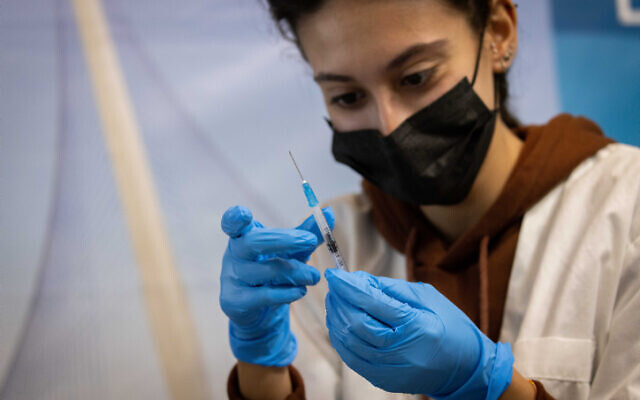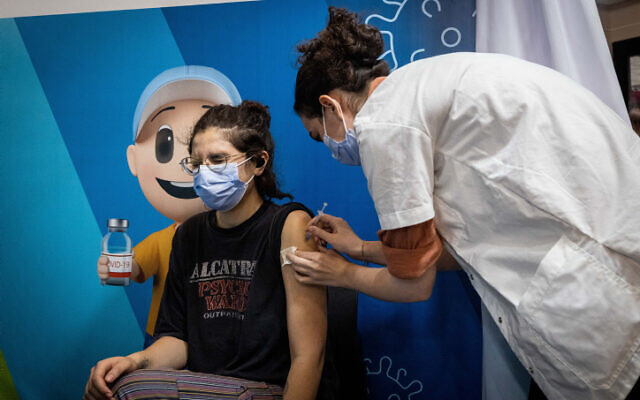Prime Minister Naftali Bennett said on Saturday that it was “still too early to celebrate” among other signs that the current wave of COVID-19 is easing.
“We are at a critical stage,” the premier said in a statement, with the intention of reopening the education system and ending mass quarantines and moving to a model of widespread testing and quarantining only verified cases.
“It is okay now that we should be strict about Green Pass, be careful and not complacent,” he called on all those who have not been fully vaccinated to do so as soon as possible. .
“The vaccine saves lives, and the country’s range of vaccinations is what allows it to remain open and functional.”
New green pass rules were due to take effect on Sunday, with many Israelis set to lose their passes under updated immunity guidelines, for not being vaccinated with a COVID-19 booster shot.
Also, police will take steps to enforce a proof of vaccine document at gatherings and places in cities with high rates of infection.

Health workers prepare a COVID-19 vaccine at a vaccination center in Jerusalem on September 30, 2021. (Jonatan Sindel/Flash90)
Israel – the first country to officially offer a third dose – launched its COVID-19 booster campaign on August 1, initially rolling it out to people over the age of 60. The eligibility age was then gradually lowered, eventually expanding to everyone over the age of 12. And Up who got a second shot at least five months ago.
Starting on Sunday, the Green Pass will be valid for six months from the date of the last shot of a person. All existing green passes will be canceled and all Israelis will have to obtain new passes through the Ministry of Health Website Or Application (New passes cannot be issued before Sunday).
The pass is valid only one week after receiving the last required dose. The document, held by people who have been vaccinated or recovered from COVID-19, enables access to a number of public places and events, including restaurants and museums.
A temporary green pass can also be obtained through a negative virus test, which must be paid for until the person is eligible for vaccination.
As new, more restrictive rules go into effect, Israel continues to show signs that it is coming out of its fourth COVID-19 wave. On Friday, the number of Israelis hospitalized in serious condition due to COVID-19 fell below 600 for the first time since August 17, according to health ministry data.

Young students arrive for their first day of school after the holidays at the Gabriel School in Tel Aviv on September 30, 2021. (Avshalom Sasoni/Flash 90)
The new number of serious cases stood at 586. Of those patients, 422 had not been vaccinated, 108 had received only two of the three vaccines, and 37 patients had received all three shots.
Of the nearly 120,000 samples tested on Thursday, 3.81 per cent (or 4,353) came back positive. The total number of active cases stood at 45,412, raising the death toll by five to 7,766 since the start of the pandemic.
Health Ministry Director-General Nachman Aish said on Friday that Israel is nearing the end of the virus wave that began in late June.
“I believe we are on a real decline [in infection], but we’ll see it in the next few days,” Ash told Radio 103FM. “I believe the fourth wave is coming to an end.”

A woman receives a dose of a COVID-19 vaccine in Jerusalem on September 30, 2021. (Yontan Sindel/Flash90)
However, he added that with schools reopening after the Jewish holidays, the infection rate could rise again. “It’s hard to predict, and it’s certainly one of our concerns for the coming weeks,” he said.
Also on Friday, government data put the virus’s basic reproduction rate at 0.72, which measures transmission. This figure measures how many people, on average, each virus-positive person infects. Any number greater than 1 indicates that infections are on the rise, while a figure below that level indicates the outbreak is coming to an end.
For the first time in a month, a high-level coronavirus cabinet will also be held on Sunday. public controversy Bennett and health officials.
At a briefing with Israeli journalists in New York, Bennett accused medical experts of advising the government to “not see the full picture” and insisted they do not make final decisions – the government does.
Health Minister Nitzen Horowitz called the comments “unnecessary and unfortunate”, while Ashe said the words were unexpected and “unpleasant”.
Bennett met with top health officials on Thursday, and they issued a joint message that appeared to end the feud. The Cannes public broadcaster reported on Friday that the two sides also agreed to release future information about COVID policy through joint statements.